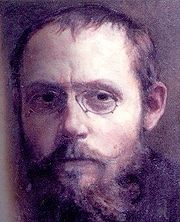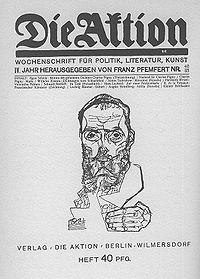
Charles Péguy
Encyclopedia

Charles Péguy was a noted French
France
The French Republic , The French Republic , The French Republic , (commonly known as France , is a unitary semi-presidential republic in Western Europe with several overseas territories and islands located on other continents and in the Indian, Pacific, and Atlantic oceans. Metropolitan France...
poet
Poet
A poet is a person who writes poetry. A poet's work can be literal, meaning that his work is derived from a specific event, or metaphorical, meaning that his work can take on many meanings and forms. Poets have existed since antiquity, in nearly all languages, and have produced works that vary...
, essayist, and editor. His two main philosophies were socialism
Socialism
Socialism is an economic system characterized by social ownership of the means of production and cooperative management of the economy; or a political philosophy advocating such a system. "Social ownership" may refer to any one of, or a combination of, the following: cooperative enterprises,...
and nationalism
Nationalism
Nationalism is a political ideology that involves a strong identification of a group of individuals with a political entity defined in national terms, i.e. a nation. In the 'modernist' image of the nation, it is nationalism that creates national identity. There are various definitions for what...
, but by 1908 at the latest, after years of uneasy agnosticism, he had become a devout but non-practicing Roman Catholic
Roman Catholic Church
The Catholic Church, also known as the Roman Catholic Church, is the world's largest Christian church, with over a billion members. Led by the Pope, it defines its mission as spreading the gospel of Jesus Christ, administering the sacraments and exercising charity...
.
From that time, Catholicism strongly influenced his works.
Biography
Péguy was born to poverty. His mother, widowed when he was an infant, mended chairs for a living. He studied at the Lycée LakanalLycée Lakanal
Lycée Lakanal is a secondary public school in Sceaux, France. It was named after Joseph Lakanal, a French politician, and an original member of the Institut de France. The school also offers a middle school and highly ranked "classes préparatoires" undergraduate training...
in Sceaux
Sceaux
Sceaux is the name or part of the name of several communes in France:* Sceaux, Yonne, in the Yonne département* Sceaux, Hauts-de-Seine, in the Hauts-de-Seine département, famous for the Château de Sceaux...
, winning a scholarship at the École Normale Supérieure
École Normale Supérieure
The École normale supérieure is one of the most prestigious French grandes écoles...
, where he attended notably the lectures of Henri Bergson
Henri Bergson
Henri-Louis Bergson was a major French philosopher, influential especially in the first half of the 20th century. Bergson convinced many thinkers that immediate experience and intuition are more significant than rationalism and science for understanding reality.He was awarded the 1927 Nobel Prize...
and Romain Rolland
Romain Rolland
Romain Rolland was a French dramatist, novelist, essayist, art historian and mystic who was awarded the Nobel Prize for Literature in 1915.-Biography:...
, whom he befriended. He formally left the École Normale, without graduating, in 1897, even though he continued attending some lectures in 1898. Influenced by Lucien Herr (librarian of the École Normale), he became an ardent Dreyfusard
Dreyfus Affair
The Dreyfus affair was a political scandal that divided France in the 1890s and the early 1900s. It involved the conviction for treason in November 1894 of Captain Alfred Dreyfus, a young French artillery officer of Alsatian Jewish descent...
.
From his earliest years, he was influenced by socialism. From 1900 to his death in 1914, he was the main contributor and the editor of the literary magazine Les Cahiers de la Quinzaine, which first supported the Socialist Party
Socialist Party (France)
The Socialist Party is a social-democratic political party in France and the largest party of the French centre-left. It is one of the two major contemporary political parties in France, along with the center-right Union for a Popular Movement...
director Jean Jaurès
Jean Jaurès
Jean Léon Jaurès was a French Socialist leader. Initially an Opportunist Republican, he evolved into one of the first social democrats, becoming the leader, in 1902, of the French Socialist Party, which opposed Jules Guesde's revolutionary Socialist Party of France. Both parties merged in 1905 in...
. Péguy ultimately ended his support after he began viewing Jaurès as a traitor to the nation and to socialism. In the Cahiers, Péguy published not only his own essays and poetry, but also works by important contemporary authors such as Romain Rolland
Romain Rolland
Romain Rolland was a French dramatist, novelist, essayist, art historian and mystic who was awarded the Nobel Prize for Literature in 1915.-Biography:...
.
His free verse poem, "Portico of the Mystery of the Second Virtue",
has gone through more than 60 editions in France. It was a favorite book of Charles de Gaulle
Charles de Gaulle
Charles André Joseph Marie de Gaulle was a French general and statesman who led the Free French Forces during World War II. He later founded the French Fifth Republic in 1958 and served as its first President from 1959 to 1969....
.
He died in battle, shot in the forehead, in Villeroy
Villeroy, Seine-et-Marne
Villeroy is a commune in the Seine-et-Marne department in the Île-de-France region in north-central France.-External links:* *...
, Seine-et-Marne
Seine-et-Marne
Seine-et-Marne is a French department, named after the Seine and Marne rivers, and located in the Île-de-France region.- History:Seine-et-Marne is one of the original 83 departments, created on March 4, 1790 during the French Revolution in application of the law of December 22, 1789...
during World War I
World War I
World War I , which was predominantly called the World War or the Great War from its occurrence until 1939, and the First World War or World War I thereafter, was a major war centred in Europe that began on 28 July 1914 and lasted until 11 November 1918...
, on the day before the beginning of the Battle of the Marne
First Battle of the Marne
The Battle of the Marne was a First World War battle fought between 5 and 12 September 1914. It resulted in an Allied victory against the German Army under Chief of Staff Helmuth von Moltke the Younger. The battle effectively ended the month long German offensive that opened the war and had...
.
Influence

Benito Mussolini
Benito Amilcare Andrea Mussolini was an Italian politician who led the National Fascist Party and is credited with being one of the key figures in the creation of Fascism....
referred to Péguy as a "source" for Fascism
Italian Fascism
Italian Fascism also known as Fascism with a capital "F" refers to the original fascist ideology in Italy. This ideology is associated with the National Fascist Party which under Benito Mussolini ruled the Kingdom of Italy from 1922 until 1943, the Republican Fascist Party which ruled the Italian...
. But, according to Zaretsky in The Virginia Quarterly Review, Péguy would have likely been horrified by this appropriation.
At the end of Graham Greene
Graham Greene
Henry Graham Greene, OM, CH was an English author, playwright and literary critic. His works explore the ambivalent moral and political issues of the modern world...
's novel Brighton Rock (1938), the unnamed Frenchman the old priest tells Rose about, who never took the sacraments but who some think was a saint, is obviously Péguy.
In 1983, Geoffrey Hill
Geoffrey Hill
Geoffrey Hill is an English poet, professor emeritus of English literature and religion, and former co-director of the Editorial Institute, at Boston University. Hill has been considered to be among the most distinguished poets of his generation...
published a long poem with the title The Mystery of the Charity of Charles Péguy.
Famous quotations
"The sinner is at the very heart of Christianity. Nobody is so competent as the sinner in matters of Christianity. Nobody, except the saint.""It will never be known what acts of cowardice have been committed for fear of not looking sufficiently progressive." (Notre Patrie, 1905).
"Tyranny is always better organised than freedom".
"It has never been given to a man to attain at once his happiness and his salvation."
"Homer is new and fresh this morning, and nothing, perhaps, is so old and tired as today's newspaper."
"Surrender is essentially an operation by means of which we set out explaining instead of acting."
"He who does not bellow the truth when he knows the truth makes himself the accomplice of liars and forgers."
"A word is not the same with one writer as with another. One tears it from his guts. The other pulls it out of his overcoat pocket."
"How maddening, says God, it will be when there are no longer any Frenchmen";
"There will be things that I do that no one will be left to understand." (Le Mystère des saints Innocents)
"It is impossible to write ancient history because we do not have enough sources, and impossible to write modern history because we have too many". (Clio, 1909)
"Everything begins in mysticism and ends in politics." (Notre Jeunesse, 1909)
Works
- Jeanne d' Arc (1897)
- Notre Patrie (1905)
- Situations (1907–1908)
- Notre Jeunesse (1909) - Recollections of the campaign for Alfred DreyfusAlfred DreyfusAlfred Dreyfus was a French artillery officer of Jewish background whose trial and conviction in 1894 on charges of treason became one of the most tense political dramas in modern French and European history...
. - Clio, dialogue de l'histoire et de l'âme païenne (1909–1912)
- Le Mystère de la charité de Jeanne d'Arc (1910)
- Victor-Marie, comte Hugo (1911)
- L'Argent (1912)
- Le Porche du mystère de la deuxième vertu (1912)
(translated into English as The Portal of the Mystery of Hope)
- Le Mystère des saints Innocents (1912)
- La Tapisserie de sainte Geneviève et de Jeanne d'Arc (1913)
- La Tapisserie de Notre-Dame (1913)
- Ève (1913)
- Note sur M. Bergson (1914)
- Cahiers
- Charles Peguy: Basic Verities, Prose and Poetry Transated by AnnAnne GreenAnne Green was an American writer and translator, the sister of Julien Green. While a child, Green's parents moved to France, where her father, ruined by a financial crisis and poor investments, came to settle. She spent her childhood in Le Havre, before her parents moved to Paris, where her...
and Julien GreenJulien GreenJulien Green , was an American writer, who authored several novels, including Léviathan and Each in His Own Darkness...
(1943) Pantheon BooksPantheon BooksPantheon Books is an American imprint with editorial independence that is part of the Knopf Doubleday Publishing Group.The current editor-in-chief at Pantheon Books is Dan Frank.-Overview:...
, New York
External links
- Charles Péguy biography at The Literary EncyclopediaThe Literary EncyclopediaThe Literary Encyclopedia is an online reference work first published in October 2000 which, as of May 2008, offers freely available content together with full content and services for subscribing members. Articles are written by "nearly 2000 named scholars, most of whom are current university...
, by James Horrox

